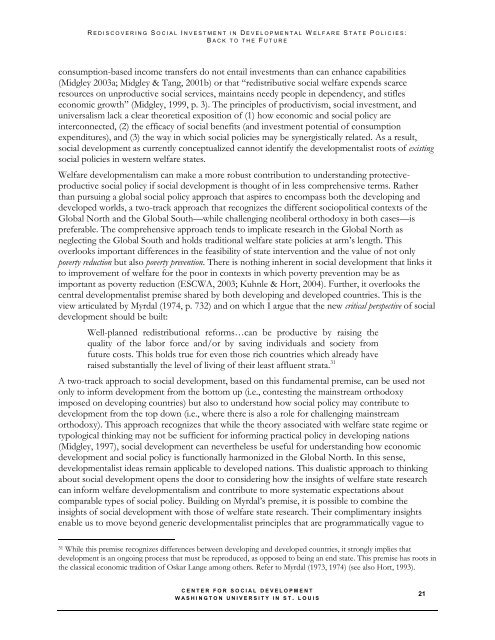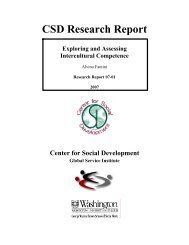Rediscovering social investment in developmental welfare state ...
Rediscovering social investment in developmental welfare state ...
Rediscovering social investment in developmental welfare state ...
You also want an ePaper? Increase the reach of your titles
YUMPU automatically turns print PDFs into web optimized ePapers that Google loves.
R E D I S C O V E R I N G S O C I A L I N V E S T M E N T I N D E V E L O P M E N T A L W E L F A R E S T A T E P O L I C I E S :<br />
B A C K T O T H E F U T U R E<br />
consumption-based <strong>in</strong>come transfers do not entail <strong><strong>in</strong>vestment</strong>s than can enhance capabilities<br />
(Midgley 2003a; Midgley & Tang, 2001b) or that ―redistributive <strong>social</strong> <strong>welfare</strong> expends scarce<br />
resources on unproductive <strong>social</strong> services, ma<strong>in</strong>ta<strong>in</strong>s needy people <strong>in</strong> dependency, and stifles<br />
economic growth‖ (Midgley, 1999, p. 3). The pr<strong>in</strong>ciples of productivism, <strong>social</strong> <strong><strong>in</strong>vestment</strong>, and<br />
universalism lack a clear theoretical exposition of (1) how economic and <strong>social</strong> policy are<br />
<strong>in</strong>terconnected, (2) the efficacy of <strong>social</strong> benefits (and <strong><strong>in</strong>vestment</strong> potential of consumption<br />
expenditures), and (3) the way <strong>in</strong> which <strong>social</strong> policies may be synergistically related. As a result,<br />
<strong>social</strong> development as currently conceptualized cannot identify the <strong>developmental</strong>ist roots of exist<strong>in</strong>g<br />
<strong>social</strong> policies <strong>in</strong> western <strong>welfare</strong> <strong>state</strong>s.<br />
Welfare <strong>developmental</strong>ism can make a more robust contribution to understand<strong>in</strong>g protectiveproductive<br />
<strong>social</strong> policy if <strong>social</strong> development is thought of <strong>in</strong> less comprehensive terms. Rather<br />
than pursu<strong>in</strong>g a global <strong>social</strong> policy approach that aspires to encompass both the develop<strong>in</strong>g and<br />
developed worlds, a two-track approach that recognizes the different sociopolitical contexts of the<br />
Global North and the Global South—while challeng<strong>in</strong>g neoliberal orthodoxy <strong>in</strong> both cases—is<br />
preferable. The comprehensive approach tends to implicate research <strong>in</strong> the Global North as<br />
neglect<strong>in</strong>g the Global South and holds traditional <strong>welfare</strong> <strong>state</strong> policies at arm‘s length. This<br />
overlooks important differences <strong>in</strong> the feasibility of <strong>state</strong> <strong>in</strong>tervention and the value of not only<br />
poverty reduction but also poverty prevention. There is noth<strong>in</strong>g <strong>in</strong>herent <strong>in</strong> <strong>social</strong> development that l<strong>in</strong>ks it<br />
to improvement of <strong>welfare</strong> for the poor <strong>in</strong> contexts <strong>in</strong> which poverty prevention may be as<br />
important as poverty reduction (ESCWA, 2003; Kuhnle & Hort, 2004). Further, it overlooks the<br />
central <strong>developmental</strong>ist premise shared by both develop<strong>in</strong>g and developed countries. This is the<br />
view articulated by Myrdal (1974, p. 732) and on which I argue that the new critical perspective of <strong>social</strong><br />
development should be built:<br />
Well-planned redistributional reforms…can be productive by rais<strong>in</strong>g the<br />
quality of the labor force and/or by sav<strong>in</strong>g <strong>in</strong>dividuals and society from<br />
future costs. This holds true for even those rich countries which already have<br />
raised substantially the level of liv<strong>in</strong>g of their least affluent strata. 31<br />
A two-track approach to <strong>social</strong> development, based on this fundamental premise, can be used not<br />
only to <strong>in</strong>form development from the bottom up (i.e., contest<strong>in</strong>g the ma<strong>in</strong>stream orthodoxy<br />
imposed on develop<strong>in</strong>g countries) but also to understand how <strong>social</strong> policy may contribute to<br />
development from the top down (i.e., where there is also a role for challeng<strong>in</strong>g ma<strong>in</strong>stream<br />
orthodoxy). This approach recognizes that while the theory associated with <strong>welfare</strong> <strong>state</strong> regime or<br />
typological th<strong>in</strong>k<strong>in</strong>g may not be sufficient for <strong>in</strong>form<strong>in</strong>g practical policy <strong>in</strong> develop<strong>in</strong>g nations<br />
(Midgley, 1997), <strong>social</strong> development can nevertheless be useful for understand<strong>in</strong>g how economic<br />
development and <strong>social</strong> policy is functionally harmonized <strong>in</strong> the Global North. In this sense,<br />
<strong>developmental</strong>ist ideas rema<strong>in</strong> applicable to developed nations. This dualistic approach to th<strong>in</strong>k<strong>in</strong>g<br />
about <strong>social</strong> development opens the door to consider<strong>in</strong>g how the <strong>in</strong>sights of <strong>welfare</strong> <strong>state</strong> research<br />
can <strong>in</strong>form <strong>welfare</strong> <strong>developmental</strong>ism and contribute to more systematic expectations about<br />
comparable types of <strong>social</strong> policy. Build<strong>in</strong>g on Myrdal‘s premise, it is possible to comb<strong>in</strong>e the<br />
<strong>in</strong>sights of <strong>social</strong> development with those of <strong>welfare</strong> <strong>state</strong> research. Their complimentary <strong>in</strong>sights<br />
enable us to move beyond generic <strong>developmental</strong>ist pr<strong>in</strong>ciples that are programmatically vague to<br />
31 While this premise recognizes differences between develop<strong>in</strong>g and developed countries, it strongly implies that<br />
development is an ongo<strong>in</strong>g process that must be reproduced, as opposed to be<strong>in</strong>g an end <strong>state</strong>. This premise has roots <strong>in</strong><br />
the classical economic tradition of Oskar Lange among others. Refer to Myrdal (1973, 1974) (see also Hort, 1993).<br />
C E N T E R F O R S O C I A L D E V E L O P M E N T<br />
W A S H I N G T O N U N I V E R S I T Y I N S T . L O U I S<br />
21
















